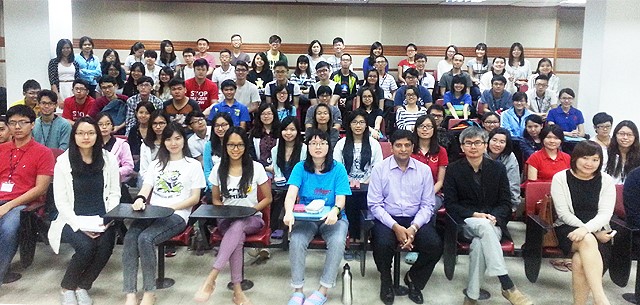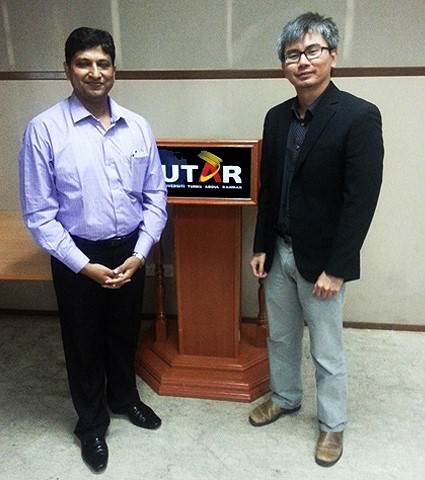

Front row, second from right: Dr Te and Dr Mangal with TCM students and staff
The Department of Chinese Medicine from the Faculty of Medicine and Health Sciences hosted a talk on Ayurveda with Dr Gopesh Mangal from the National Institute of Ayurveda, India as the guest speaker at UTAR Sungai Long Campus on 13 November 2015.
According to the speaker, the term Ayurveda is a blend of two Sanskrit words, Ayus (life) and Veda (knowledge or science), referring to the science of life. Ayurvedic medicine is a type of traditional medicine using a combination of foods, herbs, and breathing exercises.
“While Ayurveda is considered as an alternative medicine, it is one of the mainstream healthcare systems in India which caters to about 75% of the population. Ayurveda seeks to restore harmony between oneself and the environment to generate an optimal state of health. The uniqueness of Ayurveda is that each patient is regarded as a distinct individual instead of a generic group, hence each patient is treated with a specialised approach according to individual needs,” said Dr Mangal.
“However, it is of particular concern when the medicine is prescribed by non-certified practitioners which has led to the abuse of Ayurvedic medicine and prejudice towards Ayurveda. One of the most common misperceptions is that Ayurveda is merely home remedies and not scientifically-proven. Like modern medicine, Ayurvedic medicine also requires vigorous procedures such as laboratory tests, clinical trials, and certifications conducted by qualified physicians, in compliance with laws and regulations,” Dr Mangal explained.
He added, “Ayurveda is recognised by the World Health Organisation (WHO). It is also very well-received in Malaysia despite cultural diversity. Similarly, all traditional medicines, including Traditional Chinese Medicine (TCM), serve everyone in the community and across the globe.”
The Head of Chinese Medicine Department, Dr Te Kian Keong said, “The main objective of this talk is to broaden the TCM students’ perspective towards the medical field and extend their knowledge on other traditional medicines in addition to TCM. It is also a timely juncture to exude a sense of relevance to what our students have learnt in the programme as TCM novices.”

Dr Mangal (left) and Dr Te (right) had a discussion on traditional medicine after the talk
Dr Mangal is currently based in the Ministry of Health (MoH), Malaysia under the Traditional and Complementary Medicine (T&CM) Division as an Ayurveda expert. He has 11 years of academic, clinical, and research experience related to Ayurveda. He is also the author of nine books on Ayurveda, Panchakarma, and Yoga published in India, Germany, and Malaysia.
Twenty-four TCM undergraduates are currently receiving clinical training in China, with 12 in Guangxi, seven in Yangzhou, and five in Hangzhou. The students are expected to complete their residency in March 2016. UTAR TCM has also collaborated with MoH and five other local universities for TCM Practitioners Enhancement Course since 19 September 2015 (Read more at: http://www.utar.edu.my/econtent_sub.jsp?fcatid=16&fcontentid=26918).
![]()
Wholly owned by UTAR Education Foundation Co. No. 578227-M LEGAL STATEMENT TERM OF USAGE PRIVACY NOTICE